Max Blumenthal and Ben Norton present a PBS Frontline special as the latest vehicle in a PR campaign by Beltway think tanks and foreign policy veterans to reposition Mohammad Jolani as an “asset.”
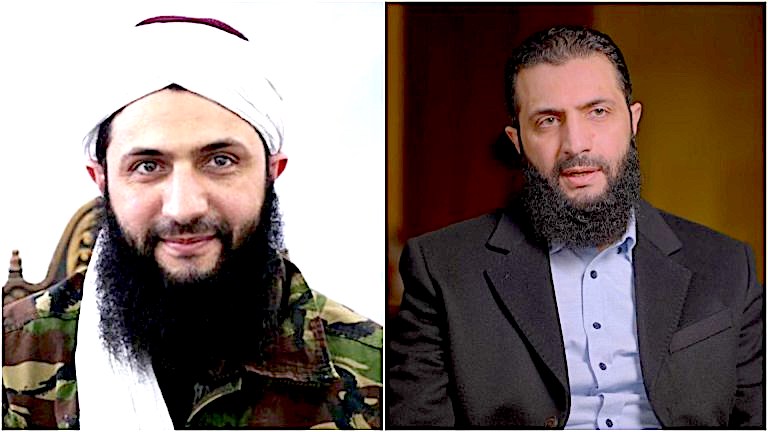
Jabhat al-Nusra founder Mohammad al-Jolani before and after his image makeover.
By Max Blumenthal and Ben Norton
The Grayzone

 March 2021 marked the 10th anniversary of the Western regime-change war on Syria. And after a decade of grueling conflict, Washington is still maneuvering to extend its longstanding relationship with the Salafi-jihadist militants fighting Syrian President Bashar al-Assad.
March 2021 marked the 10th anniversary of the Western regime-change war on Syria. And after a decade of grueling conflict, Washington is still maneuvering to extend its longstanding relationship with the Salafi-jihadist militants fighting Syrian President Bashar al-Assad.
With the northwestern province of Idlib under the control of a self-proclaimed “Syrian Salvation Government” led by the rebranded version of Syria’s al-Qaeda franchise, and protected under the military aegis of NATO member state Turkey, powerful elements from Brussels to Washington have been working to legitimize its leader.
This June, PBS Frontline aired a special, “The Jihadist,” featuring a sit-down interview with Abu Mohammad al-Jolani, de facto president of the “Syrian Salvation Government” and founder of the Syrian branch of al-Qaeda originally called Jabhat al-Nusra, today re-branded as Hay-at Tahrir al-Sham, or HTS.
Having traded in his battlefield garb for a freshly pressed suit, Jolani was presented with the once unthinkable opportunity to market himself to a Western audience and pledge that his forces pose no threat to the U.S. homeland because they were merely focused on waging war against Syria’s “loyalist” population.
The PBS correspondent who conducted the interview, Martin Smith, previously starred in a 2015 PBS special, “Inside Assad’s Syria,” which presented a U.S. audience with a rare and relatively objective look at life inside Syrian government-controlled territory, as insurgents backed by NATO and Gulf monarchies encircled and terrorized its population.
Whether or not he realized it, when Smith returned to Syria this March to meet Jolani, he was on more than a journalistic field expedition. A network of think tanks and Beltway foreign policy veterans were engaged in a simultaneous push to remove Jolani and his militant faction HTS from the State Department’s list of designated terrorist groups.
This would open the door for international acceptance of his de facto government in Idlib, which regime-change advocates view as an important piece of leverage against Damascus, and as a human warehouse for the millions of refugees languishing there.
In turn, the audacious PR campaign would consolidate a branch of the organization responsible for the Sept. 11 attacks on the United States into a de facto U.S. asset.
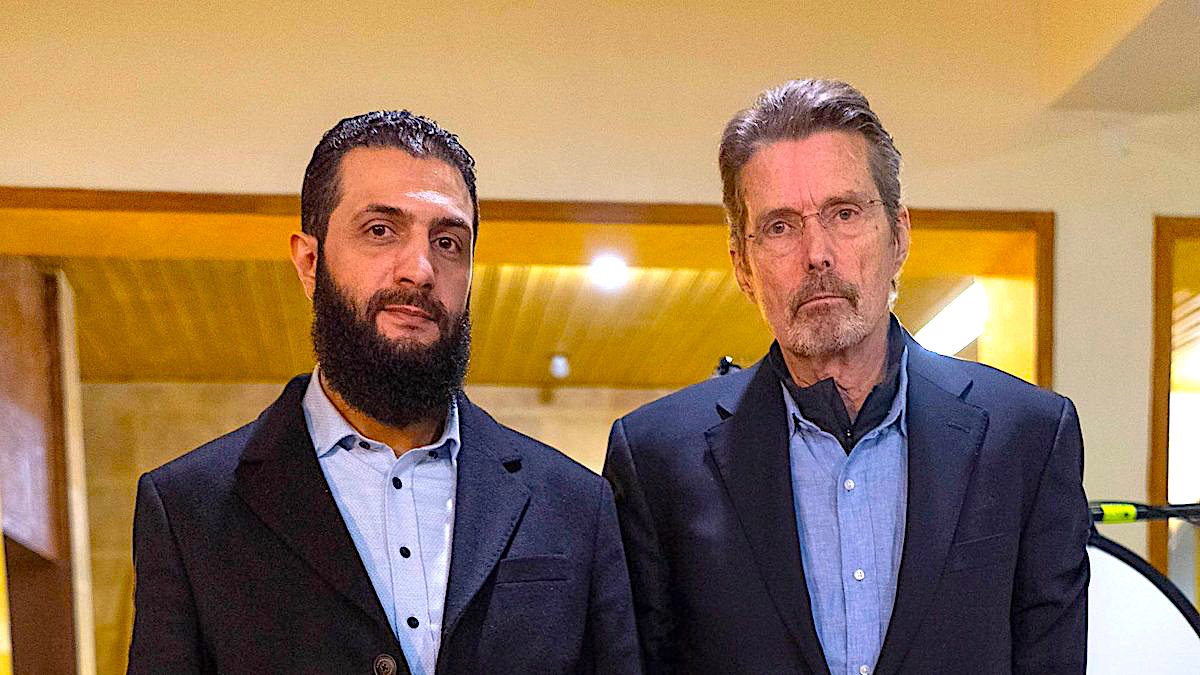
Syrian Al Qaeda leader Mohammad al-Jolani, left, with PBS Frontline’s Martin Smith.
The campaign to normalize Jolani was publicly initiated by the International Crisis Group, a Brussels-based think tank with close ties to the Biden administration and NATO. By the time of Smith’s interview, operatives from a network of Gulf-funded, pro-Israel think tanks had spent years quietly lobbying for Washington to support al-Qaeda’s Syrian franchise, and succeeded in securing shipments of weapons from the CIA to some of its battlefield allies.
Though figures involved in this coordinated lobbying push were featured in Smith’s PBS Frontline report, they were presented to viewers as dispassionate analysts or former officials with no ulterior interests.
Framed as hard news yet shaped by one of the most insidious public relations campaigns in recent history, the nationally broadcast PBS special provided an effective vehicle for rehabilitating a jihadist leader and perpetuating the decades-long dirty war against Syria.
Whitewashing Extremist Insurgency
When Muhammad Jolani first crossed the Syrian-Iraqi border in 2012 with a small detachment of fighters, he belonged officially to al-Qaeda in Mesopotamia, an extremist group responsible for countless attacks on U.S. military occupiers and Shia civilians across Iraq.
Upon their thrust into Syria, Jolani’s forces enabled the late self-proclaimed leader of the caliphate, Abu Bakr al-Baghdadi, to establish his Islamic State, or ISIS, in the northeastern city of Raqqa. A feud over strategy and finances soon prompted Jolani to split from the Islamic State and establish Jabhat al-Nusra, the Syrian franchise of al-Qaeda, with the explicit blessing of the jihadist group’s global leader, Ayman al-Zawahiri.
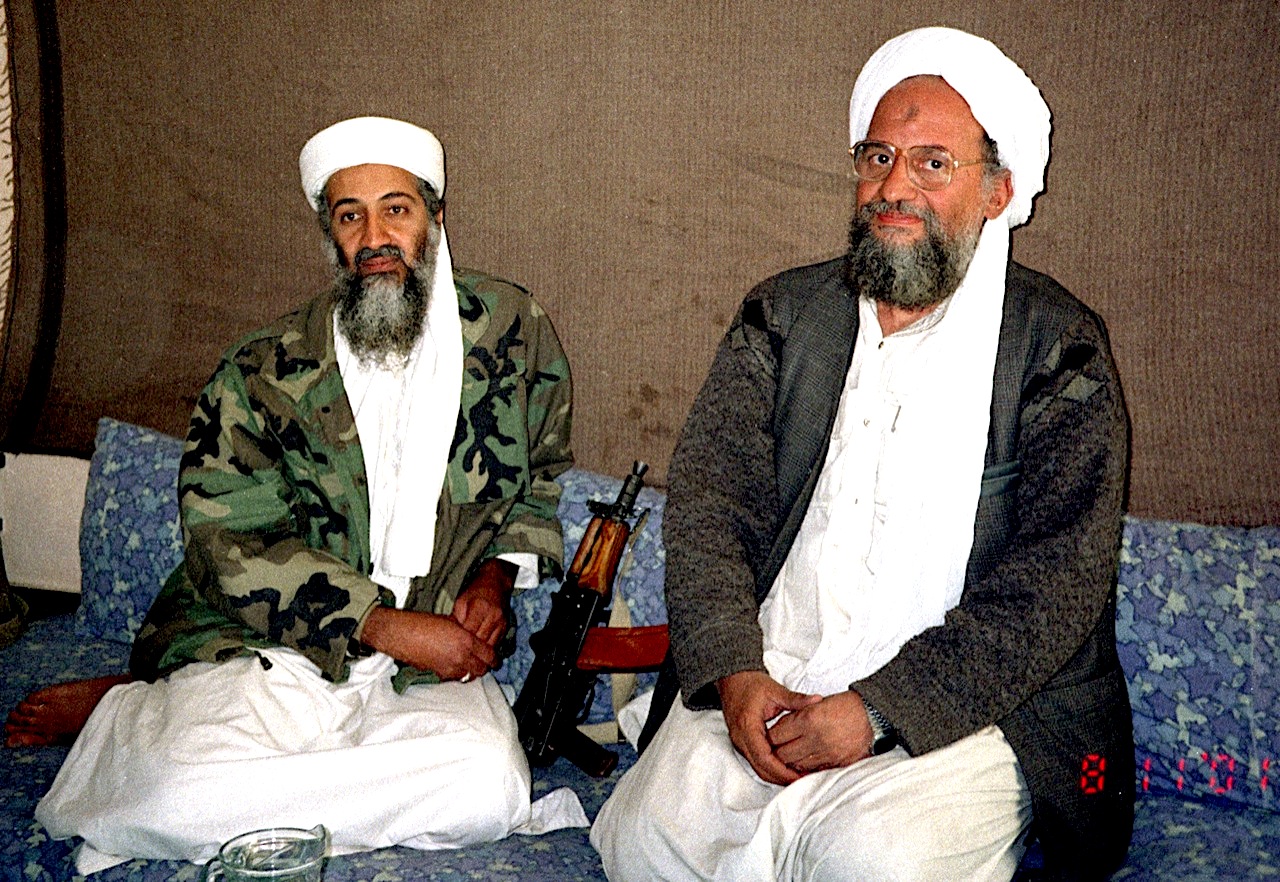
Ayman al-Zawahiri, on right, serving as interpreter for Osama bin Laden, left, during an interview with Pakistani journalist Hamid Mir in November 2001. (Hamid Mir, CC BY-SA 3.0, Wikimedia Commons)
Martin Smith recounted this history in his PBS Frontline report, albeit briefly, while neglecting any mention of the scandalous covert U.S. operation that made Nusra’s rise possible.
Smith, for instance, neglected mention of the prescient August 2012 Defense Intelligence Agency (DIA) assessment which stated clearly that “the Salafist, the Muslim Brotherhood, and AQI [al-Qaeda in Iraq] are the major forces driving the insurgency in Syria,” and that the Western-backed opposition would likely create a “Salafist principality in eastern Syria” if weapons were placed in the hands of anti-Assad Islamist militants.
Despite the warning, in 2013, the CIA launched Operation Timber Sycamore, an arm-and-equip program that funneled up to $1 billion per year (one out of every $15 in the CIA’s budget) into material support for an armed opposition thoroughly dominated by Islamist extremists. It was the agency’s largest covert operation since a similar initiative in Afghanistan in the 1980s, which gave birth to al-Qaeda and the Taliban.
Just as the DIA predicted, an extremist “Salafist principality” took root in northeastern Syria, while Al Qaeda’s local franchise quickly emerged as the dominant force within the armed opposition.
Nusra militants – including a former fighters of the CIA-created “Free Syrian Army” – were filmed cutting open the chests of Syrian soldiers, tearing their hearts out and eating the organs raw (while receiving sympathetic media coverage from the BBC).
As it seized control of the Idlib province and moved to take Damascus, Nusra earned a reputation for grisly suicide attacks and executions, while instituting a medieval-style theocratic regime in the areas it controlled. An undercover 2017 documentary filmed by local residents, “Undercover Idlib,” exposed the dystopia that unfolded under Nusra control. All non-religious music and public celebrations were banned, the wearing of colorful headscarves outlawed, and Druze and Christian residents were killed or forced to convert at gunpoint.
Rather than being uprooted from its “safe haven,” Nusra was encouraged by its NATO-aligned sponsors to rebrand and superficially distance itself from al-Qaeda so it could survive. First, in 2016, the al-Qaeda franchise changed its name to Jabhat Fateh al-Sham, then morphed into Hayat Tahrir al-Sham (HTS) the following year.
Under tutelage from Turkey, which controlled the northern border of Idlib, HTS subsequently formed the “Syrian Salvation Government,” and embarked on a PR campaign for international legitimacy.
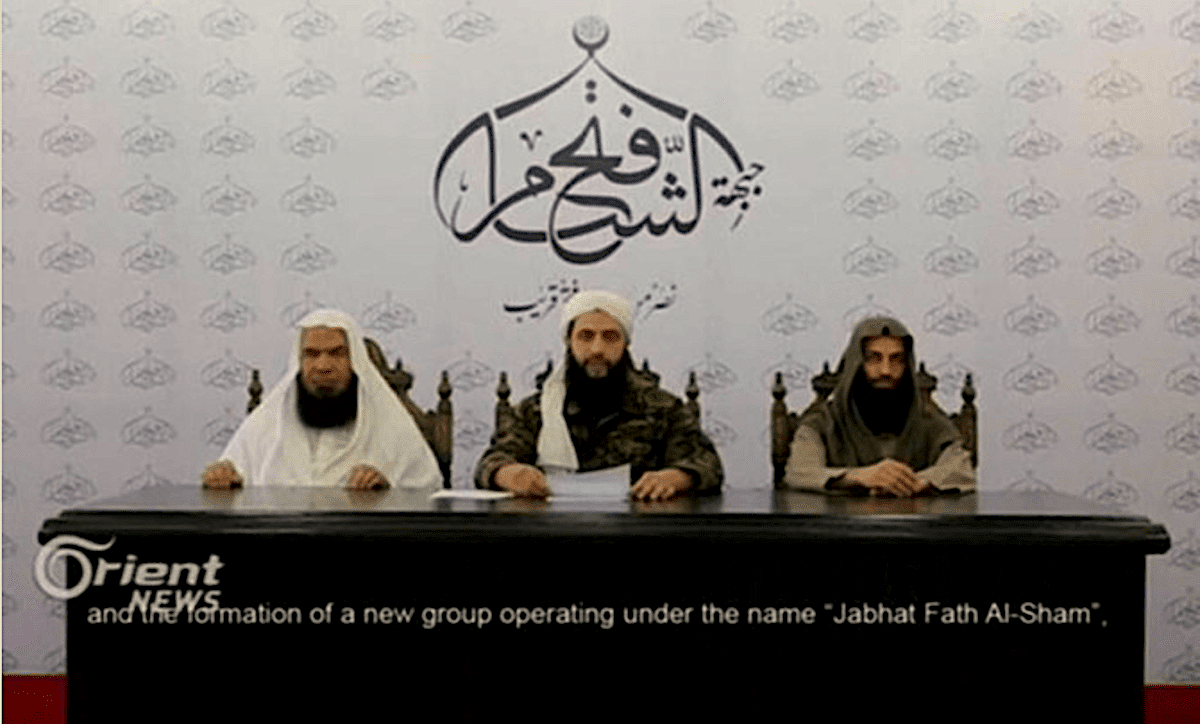
Mohammad Jolani announcing the formation of Jabhat Fateh al-Sham, formerly Jabhat al-Nusra, in 2016.
Rebranded Al Qaeda Branch Courts Western Media
In 2020, Idlib’s “Salvation Government” established a media relations office to assist the entry of Western journalists and provide them with fixers to guide them in its territory. While independent reporters (including the co-author of this article) have been subjected to waves of online abuse by mainstream Western correspondents for visiting Damascus, a New York Times tour of Idlib that was openly managed by al-Qaeda’s Syrian affiliate took place without a hint of criticism.
A New York Times press interview with Professor "Ali Keda," Prime Minister of the Salvation Government, in coordination with the Government's Media Relations Office and the Idlib Center for Media Services pic.twitter.com/z2V9QqxpXR
— Idlib center for media services (@Idlibcenter) March 30, 2021
Martin Smith’s March 2021 visit to Idlib was a similarly guided venture. His report on Jolani blended interview footage with scenes of the HTS leader pressing the flesh with residents of Idlib City, conveying the image of a popular retail politician stumping for local office.
Idlib “does not represent a threat to the security of Europe and America. This region is not a staging ground for executing foreign jihad,” Jolani reassured Smith. Over the past decade, he added, “we haven’t posed any threat to the West.”
In the interview, Smith focused entirely on whether Jolani would attack the West or not, demonstrating a near-total lack of interest in the lives of the millions of Syrians trapped under HTS’ neo-feudal rule in Idlib, and the minority groups threatened by its sectarian violence in nearby areas.
Dressed in a pressed shirt and blazer suitable for any job interview, Jolani rattled off rhetoric about the “Syrian revolution,” while stressing that his Salafi-jihadist brethren and Washington shared a common goal: regime change in Damascus.
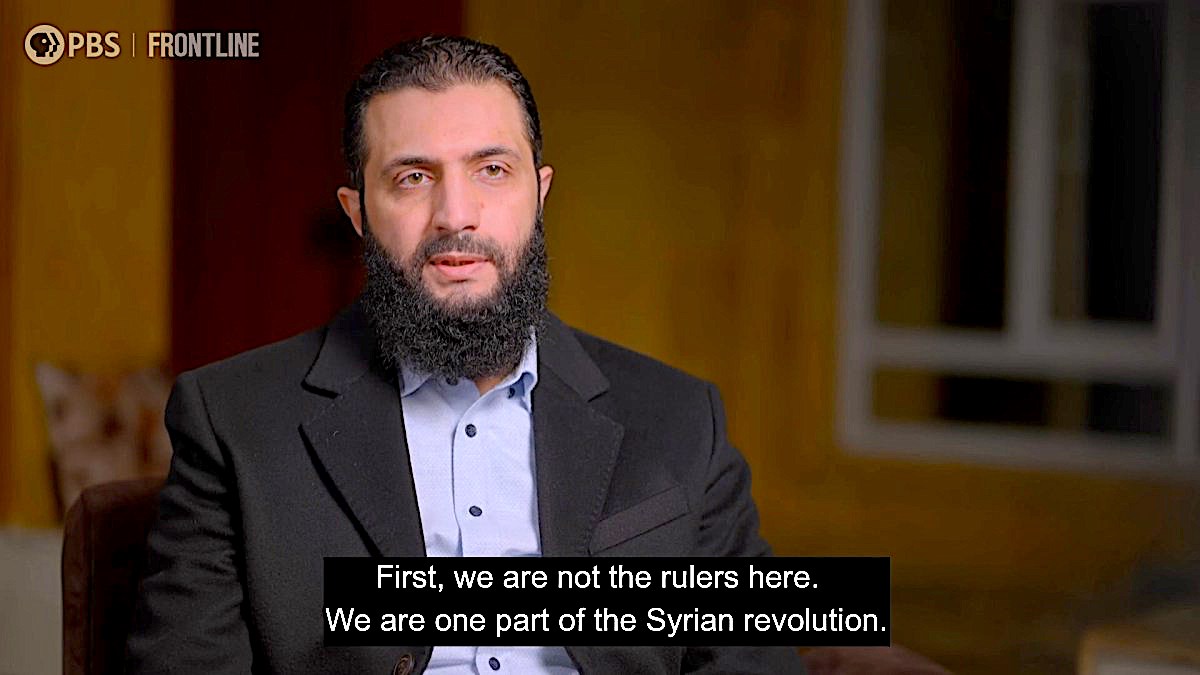
The leader of rebranded Syrian al-Qaeda, Abu Mohammad al-Jolani, doing a friendly interview with PBS in Idlib.
Days after Smith left Idlib, HTS stoned three women to death as punishment for alleged adultery. It was far from the first public execution carried out by the group. Back when it was still known as Nusra, the al-Qaeda affiliate shot a woman in the head in the middle of a plaza in Idlib because she, too, had been accused of adultery.
None of these gruesome events were mentioned in Smith’s June 2021 PBS report, which represented the culmination of a years-long campaign to normalize HTS control in northeastern Syria.
‘Al Qaeda Jas Really Got it Right’
A powerful Brussels-based think tank that is funded by Western governments helped ignite the PR campaign to legitimize HTS with a highly sympathetic 2020 “conversation” with Jolani.
The think tank behind the whitewash, the International Crisis Group, gets the plurality of its funding from the European Union, Germany, France and Australia, among other countries. It is effectively a Western intelligence cutout, and has consistently, over years, advocated for more Western military intervention in Syria.
The Crisis Group revealed that it had “[spoken] with Jolani in Idlib for four hours in late January” of 2020 while it pushed a narrative that he had become a new man.
“Following a series of rebranding efforts and internal transformations, Jolani told us, HTS presents itself today as a local group, independent of al-Qaeda’s chain of command, with a strictly Syrian, not a transnational, Islamist agenda,” the think tank wrote.
The softball interview was promoted by prominent members of the Syria regime-change lobby, including an Israeli fellow at the neoconservative, Washington-based Newlines Institute, Elizabeth Tsurkov, who has emerged as a de facto jihadi whisperer of the U.S. and Israeli foreign policy nexus.
Excellent insights by @dkhalifa who recently returned from Idlib, where she spoke at length with Abu Muhammad al-Jolani, the Commander of Hayat Tahrir al-Sham, the dominant faction in the last rebel-held pocket of Syria. https://t.co/nhSA9pxbvI
— Elizabeth Tsurkov (@Elizrael) February 20, 2020
Tsurkov complimented the extremist rulers of Idlib, writing, “HTS is arguably the most pragmatic al-Qaeda offshoot to exist.”
HTS is arguably the most pragmatic al-Qaeda offshoot to exist, changing both its rhetoric (see recent al-Jolani speeches), conduct (cooperation w/ Turkey, taming more radical groups) & indoctrination of fighters. My piece on this shift https://t.co/c6qA2DZpu3
— Elizabeth Tsurkov (@Elizrael) February 20, 2020
Then there was Ken Roth, the executive director of Human Rights Watch (HRW), a billionaire oligarch-funded NGO that frequently promotes sanctions and regime-change operations against governments that have been targeted by Washington, from Syria to Venezuela, China to Nicaragua, Belarus to Bolivia.
Roth took to Twitter twice to promote the International Crisis Group’s interview with Jolani. Both of his tweets demonized the Syrian government and its ally Russia while making no mention of the array of crimes committed by the Salafi-jihadist militia in Idlib.
Any of the millions of civilians in Idlib "will tell you that they prefer living in makeshift camps where their kids are dying in harsh weather conditions over returning to [Syrian] regime areas where they know they will be tortured and killed." https://t.co/PhwtBxk6M3
— Kenneth Roth (@KenRoth) February 22, 2020
Roth’s message was clear: liberal interventionists in the Western human rights industry were on board with the HTS rebranding campaign.
Russian & Syrian forces in Idlib "have repeatedly targeted population centres, including markets, schools and hospitals, with the effect of emptying these areas to ease the way for their recapture by regime ground forces." Who will stop them? @CrisisGroup https://t.co/yQ0xWCXFIt pic.twitter.com/hd9BGuDDMF
— Kenneth Roth (@KenRoth) February 21, 2020
In February 2021, the International Crisis Group published a follow-up paper explicitly aimed at convincing policy makers to remove the rebranded Syrian al-Qaeda franchise from the State Department’s list of terrorist organizations.
“HTS’s continued status as a ‘terrorist’ organisation (as designated by the U.S., Russia, the UN Security Council and Turkey) presents a major obstacle,” lamented the authors of the absurdly titled paper, “In Syria’s Idlib, Washington’s Chance to Reimagine Counter-terrorism.”
A co-author of the document, Syria consultant Noah Bonsey, called for Western policymakers to show more “nuance” on the rebranded al-Qaeda extremists.
The continued “terrorist” status of Syrian dominant rebel group #HTS presents a major obstacle to avoiding violence in Syria.
The Biden administration should push HTS to address key local and international concerns, so it can lose its “terrorist” label.https://t.co/PILLcRqoqO
— Crisis Group (@CrisisGroup) February 4, 2021
The thrust of the think tank’s argument was that, unlike ISIS and other al-Qaeda affiliates, “HTS has distanced itself from transnational attacks and the militants who advocate for them.” In other words, the extremist group’s campaign of violence is acceptable as long as it stays focused on the Syrian government and its allies — not on targets in Western countries.
The usual suspects enthusiastically promoted the policy paper, including the former Israeli soldier, Tsurkov.
In Syria’s Idlib, Washington’s Chance to Reimagine Counter-terrorism https://t.co/sjYNlwF4l7 Important new piece by @dkhalifa & @NoahBonsey, informed by fieldwork in Idlib & meetings with HTS' top leadership
— Elizabeth Tsurkov (@Elizrael) February 3, 2021
Perhaps the most influential member of the Syria regime-change lobby on Washington’s K Street, Charles Lister, happily promoted the proposal as well.
The British pundit, who does not speak Arabic, has spent years advocating for Syria’s Islamist extremist occupation from within think tanks such as the Brookings Doha Center and Middle East Institute, which are funded by theocratic Gulf monarchies.
During a 2017 panel discussion at NATO’s de facto think tank, the Atlantic Council, Lister described Idlib as “the heartland of al-Nusra,” acknowledging that “Al-Qaeda’s relative success in Syria has seen its ideology and its narrative mainstreamed, not just in parts of Syria, but also in parts of the region.”
At a subsequent 2018 Capitol Hill panel discussion aimed at gathering congressional support for military intervention, Lister gushed about Nusra, “Al Qaeda has really got it right, I hate to say… Their strategy is so much more effective on the ground. They are winning hearts and minds.”
Lister has even celebrated Jolani as an Islamist version of Che Guevara who “goes deep on modern Arab political history.” As for HTS, Lister praised them as “a more politically mature and intelligent jihadist movement.”
“Al-Qaeda has really got it right” – @Charles_Lister.
From my new @GrayzoneProject mini-doc “The Syria Deception – Al-Qaeda Goes to Hollywood”. Watch here: https://t.co/KOxwQx8Xro pic.twitter.com/mXPcLN5q10
— Dan Cohen (@dancohen3000) September 16, 2018
Rankled by the successful advocacy by Lister and his Gulf monarchy-backed colleagues for arming Islamist fanatics in Syria, Brett McGurk, the former U.S. special envoy against ISIS, grumbled to a reporter that the think tankers “got a lot of people killed.”
By 2021, Lister was comfortable enough to call for the rebranded al-Nusra franchise to become an official Western asset.
The U.S, #Europe & #Turkey should press #HTS to address concerns & "define clear benchmarks which (if met) could enable HTS to shed its “terrorist” label," argue @dkhalifa & @NoahBonsey.
Doing so would symbolize a new diplomacy+military approach to CT.https://t.co/I63yerGnPL pic.twitter.com/SjtXU7ijGZ
— Charles Lister (@Charles_Lister) February 3, 2021
Undisclosed Turkish & Israeli Ties
The PBS Frontline special on Jolani provided an uncritical platform to James Jeffrey, the former U.S. special representative for Syria engagement, and Andrew Tabler, a de facto Israel lobbyist and think tank pundit, presenting them to viewers as serious Syria experts without disclosing their longstanding ties to two of the most pernicious foreign backers of Syria’s Islamist insurgency.
HTS is “the least bad option of the various options on Idlib, and Idlib is one of the most important places in Syria, which is one of the most important places right now in the Middle East,” Jeffrey declared to Frontline’s Martin Smith. He was finally acknowledging what was already well known in foreign policy circles but which few dared to say out loud: Washington has been allied with al-Qaeda in Syria.
The United States has not had formal diplomatic relations with Syria for years. Damascus formally broke contact with Washington in 2012 over its support for armed militants seeking to overthrow the country’s internationally recognized government.
The absence of diplomatic relations has led to the appointment of a series of U.S. special envoys. One of the most influential, and aggressively interventionist, of these envoys has been Jeffrey.
When mainstream U.S. media outlets mention Jeffrey, they are often careful to stress that he has served in both Republican and Democratic administrations, branding him as a bipartisan figure with extensive experience working at diplomatic posts in the Middle East.
What is almost never mentioned in the many glowing media portraits of Jeffrey, however, is his deep commitment to strengthening ties with Turkey, his close personal ties to the government in Ankara and his fellowship with one of the most influential pro-Israel think tanks in Washington.
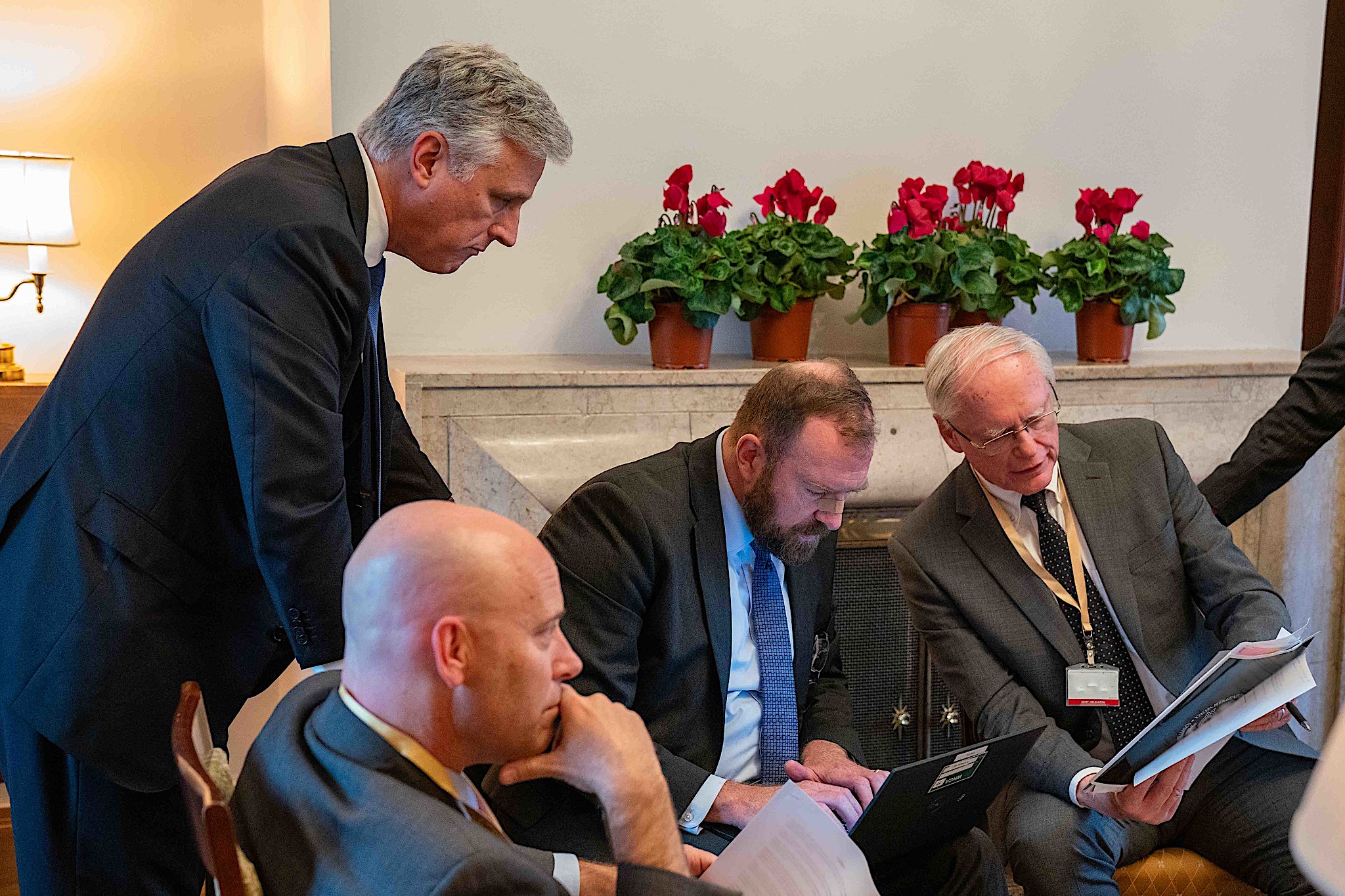
Oct, 17, 2019: James Jefrrey, at right, and other U.S. officials preparing for a meeting with Turkish President Recep Tayyip Erdogan in Ankara. (State Department, Ron Przysucha)
From 2013 to 2018, Jeffrey was a “distinguished fellow” at the Washington Institute for Near East Policy (WINEP), a D.C.-based think tank that effectively serves as a cutout for Israeli intelligence. There, Jeffrey co-authored policy papers with neoconservative operatives such as Dennis Ross, advocating for hardline anti-Iran positions and even more U.S. intervention in the Middle East.
While presenting Tehran as the “biggest challenge” for the United States, Jeffrey has been an enthusiastic advocate of closer cooperation with the Turkish government. In a report at WINEP, he maintained that “Turkey is one of the most important countries for the United States overall, and of central importance for U.S. policy.”
Jeffrey called for Washington to build deeper ties with President Recep Tayyip Erdogan, who he noted is “the most powerful Turkish leader since Mustafa Kemal Ataturk established the Turkish republic in 1923.” Jeffrey warned that failing to do so could inspire Ankara to improve its relations with longtime rival Russia.
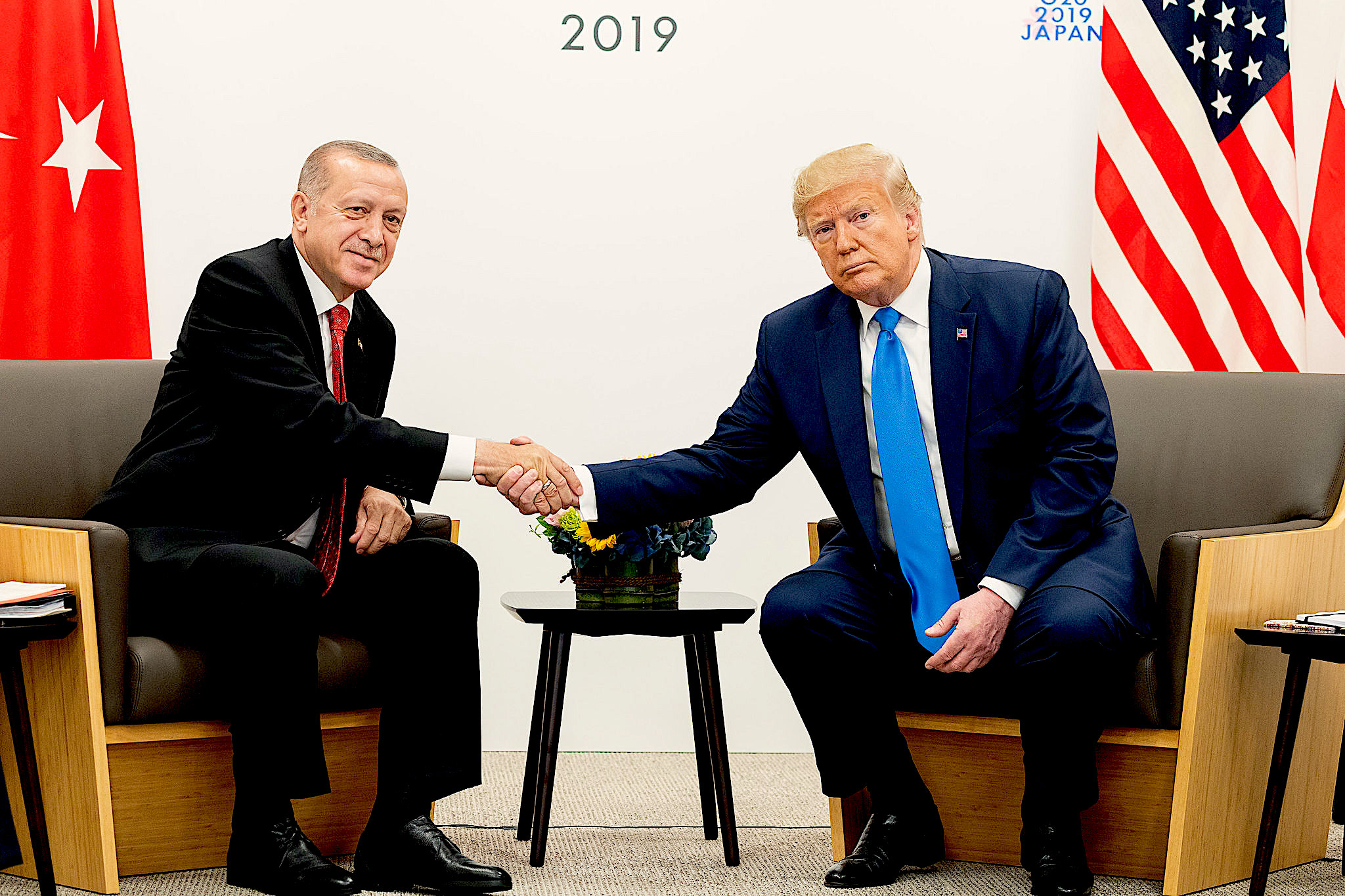
June 29, 2019: Turkey’s President Recep Tayyip Erdogan, left, and U.S. President Donald Trump at G-20 in Osaka, Japan. (White House, Shealah Craighead)
Alongside the United States, Turkey has played a pivotal role in the regime-change war on Syria. Ankara worked with the CIA to create training camps inside Turkish territory, while southern Turkey became the de facto base for Syria’s political opposition in exile, with cities like Gaziantep serving as a hub for Western intelligence agencies and their assets.
For years, Erdogan maintained an open border with his southern neighbor, allowing tens of thousands of hardened Salafi-jihadists from around the world to enter Syria and wage war on the Assad government.
This arrangement, known informally as the “jihadi highway,” allowed the Syrian opposition’s foreign sponsors to send billions of dollars’ worth of advanced weapons, including anti-tank missiles. It also gave extremist insurgents free rein to go back and forth across the porous border, seeking reinforcements and escaping retaliations by Damascus.
Ankara directly supported fanatical Islamist groups inside Syria, playing a “double game” with ISIS and effectively turning al-Qaeda affiliate Jabhat al-Nusra into a proxy.
The Turkish military has illegally invaded Syrian sovereign territory several times since 2016, and Ankara military occupies parts of Idlib and northern Syria. The rebranded al-Qaeda extremists who run Idlib, HTS, collaborate openly with the Turkish military.
Jeffrey publicly broadcasted his pro-Ankara views when, in March 2020, he and then U.S. Ambassador to United Nations Kelly Craft visited Turkey on a joint trip. On the southern border with Syria, the two diplomats posed for a photo op with the Western government-funded White Helmets, while calling for the overthrow of President Bashar al-Assad and reaffirming Washington’s support for Turkey’s policy in Idlib.
A few weeks before the visit, Jeffrey conducted an interview on Turkish TV that was republished by the U.S. embassy. The U.S. special envoy on Syria enthusiastically defended Ankara’s military occupation of parts of Idlib:
“There the United States totally agrees with Turkey on the legal presence and justification for Turkey defending its existential interests against refugee flow and dealing with terror and finding a solution to the terrible Syrian conflict with the war criminal regime of President Assad. We understand and support these legitimate Turkish interests that have Turkish forces in Syria and specifically in Idlib.”
Jeffrey later admitted that he had lied to then-President Trump about the number of troops in Syria to prevent a total withdrawal. “We were always playing shell games to not make clear to our leadership how many troops we had there,” he boasted to the military website Defense One.
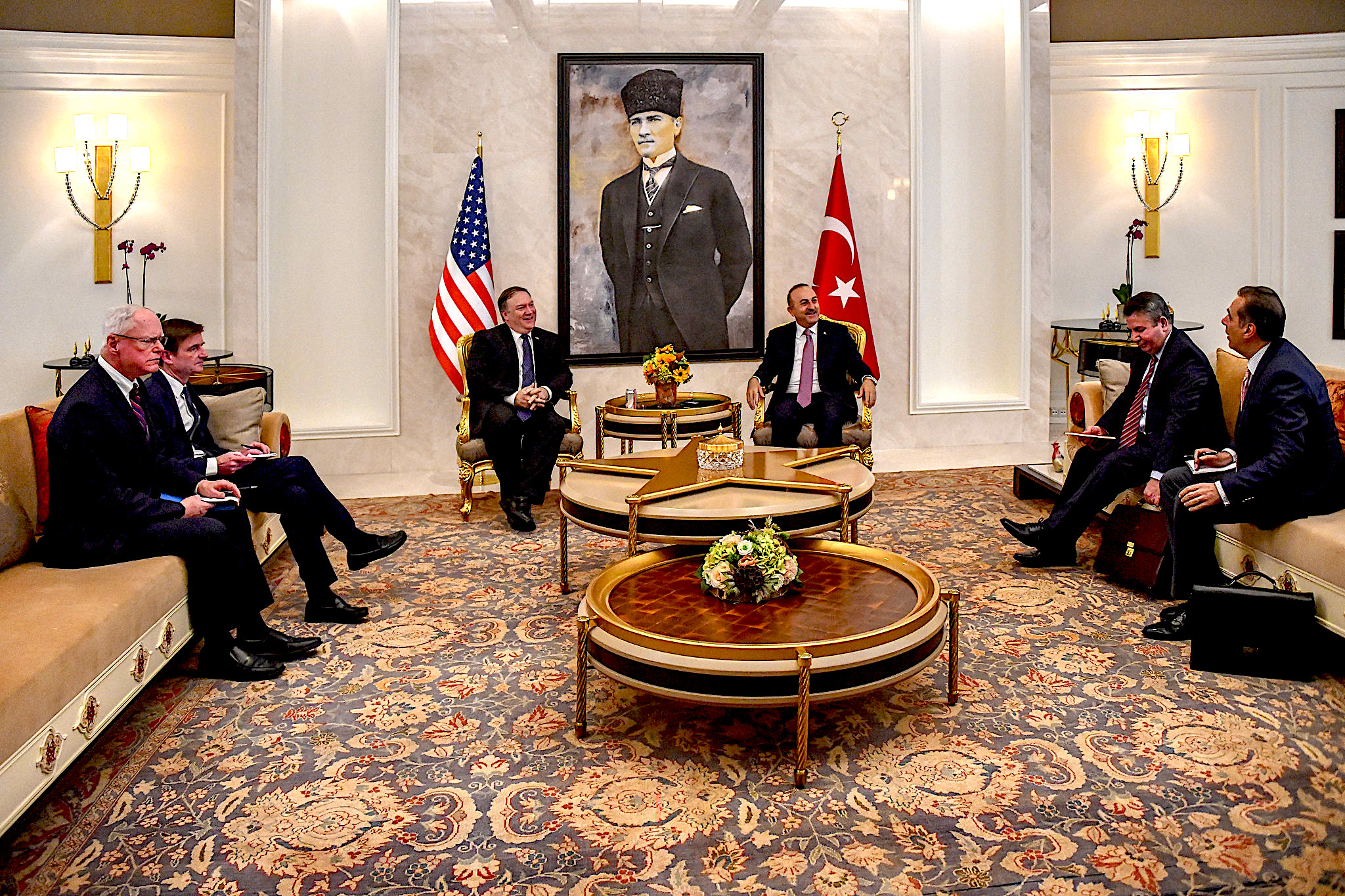
Oct. 17, 2018: Special Representative for Syria James Jeffrey, seated on far left, during a meeting between U.S. Secretary of State Michael Pompeo and Turkish Foreign Minister Mevlut Çavusoglu in Ankara. (State Department, Ron Przysucha)
A 2019 report in Foreign Policy identified Jeffrey, alongside neoconservative operative and former National Security Advisor John Bolton, as part of a group of anti-Iran hawks who “repeatedly sought to reverse Trump’s Syria withdrawal over nearly two years, culminating in a disastrous Turkish invasion that has destabilized the region.”
Foreign Policy explained: “Jeffrey began making plans to stay in northeastern Syria indefinitely as an obstacle to Assad’s attempts to consolidate power. In particular, Jeffrey’s team aimed to deny the Syrian president and his Iranian backers access to the coveted oil fields in Deir Ezzor province, which are mostly under SDF control.”
Despite Jeffrey’s relentless advocacy for more Turkish control in northern Syria, PBS Frontline’s Martin Smith portrayed him as an objective expert who was delivering clinical policy analysis uncorrupted by any ulterior political interest.
Similarly, Smith interviewed Andrew Tabler, who offered effusive praise for Turkey’s role in Idlib. Though Tabler works for the same pro-Israel Washington Institute for Near East Policy which employed Jeffrey for years, Smith presented him to viewers as a former journalist with years of supposed expertise on Syria.
In fact, Tabler has aggressively advocated a U.S. regime-change war on Syria during apparently paid Israel lobby lectures like the one he delivered to the Israel Club of Florida’s Valencia Isles.
“The United States needs to develop and execute a plan to develop its Sunni allies’ spheres of influence in Syria to help retake and stabilize those areas from ISIS and al Qaeda,” Tabler told his pro-Israel audience. “However, such an operation will only succeed if Washington not only maintains its goal of al-Assad stepping aside, but adds a military component to the strategy as well.”
Both Israel and Turkey have played central roles in destabilizing Syria from its north and south. And in Washington, figures like Jeffrey and Tabler have helped advance the interests of these two religiously sectarian human rights violators with zealous dedication.
But none of this context was provided to viewers of Smith’s PBS Frontline special on Jolani, leaving them with the impression that the two regime-change lobbyists were merely a couple of seasoned and unbiased analysts.
‘Well, It’s Complicated’
The June 2021 release of Smith’s PBS Frontline report prompted an exuberant Twitter victory lap by Lister, who celebrated the portrayal of HTS as a “semi-technocratic ‘govt,’” and touted his own 10 years of work whitewashing the exploits of its jihadist founders.
Though Jolani’s de facto job interview with the U.S. government was received positively inside the Beltway, an independent interviewer managed to challenge Smith on his approach.
He was Scott Horton, the libertarian, anti-war author and Pacifica radio host based in Austin, Texas. In an interview with Smith before the full PBS special appeared, Horton asked Smith if he confronted Jolani about his militia’s record of slaughtering members of Syria’s Druze religious minority who refused to convert to Islam, or the vicious theocratic regime he operated from East Aleppo to Idlib.
Smith responded with spin that sounded like damage control for al-Nusra: “Jolani says that a lot of mistakes were made,” the journalist said. Later, he insisted, “Well, it’s complicated,” when challenged about Jolani’s rampage of sectarian violence.
HTS is “considerably different” from al-Qaeda, Smith maintained, and “don’t participate in large-scale attacks against civilians.” He even insisted that Jolani had pledged to protect the rights of Druze, Christians and other religious minorities — although all have been ethnically cleansed from Idlib or forced to convert.
Finally, Smith claimed that Syria’s secular president was exponentially worse than the rebranded al-Qaeda leader, whose forces permitted no one but Sunni Muslims to exist under their rule. “There is no comparison between Assad and Jolani,” he argued.
In one of his only direct criticisms of HTS in the interview with Horton, Smith conceded that HTS’ prisons “can be pretty nasty places,” adding in another massive understatement that Jolani “still runs a pretty tough ship.”
However, the PBS reporter insisted that Jolani never affiliated with al-Qaeda because of ideology, but rather because of the terrorist group’s powerful “branding.”
“At this point they’re trying to get the West to warm up to them,” Smith conceded. “They are engaged now in an ongoing effort to try to set up dialogue with the West; they would like to have the terrorism designation lifted.”
Smith insisted that despite the ongoing public relations campaign on HTS’ behalf, he was not a participant in it. “The Americans are tired of wars in the Middle East,” the journalist claimed, implying that Jolani is someone the imperial planners in Washington can rely on to leave in charge.
Whether or not he was wittingly complicit, Martin Smith and his PBS Frontline report represented the culmination of the Washington-led lobbying campaign to clean up Syrian al-Qaeda’s image and secure its status as a respectable U.S. proxy.
Lindsey Snell, an American independent journalist who was held captive by Jabhat al-Nusra in Syria, scoffed at the public relations campaign waged on behalf of HTS by American media and think tanks.
In an interview with The Grayzone, Snell said HTS still upholds the same ideology as ISIS, but has decided to appeal to the West in order to preserve its influence in Idlib while pocketing millions of dollars a month in international aid and oil money.
“Actually, their rebranding campaign started when I was their captive,” Snell told The Grayzone. “They changed their name for the first time and they announced their split from Al Qaeda when I was their captive. And of course, it didn’t actually change anything.”
“To this day most of them still call themselves ‘Nusra,’” Snell added. “Their split from Al Qaeda was really just a cosmetic, surface level thing and they’re still the same terrorists inflicting Sharia law on everyone in their territories.”
The editor-in-chief of The Grayzone, Max Blumenthal is an award-winning journalist and the author of several books, including best-selling Republican Gomorrah, Goliath, The Fifty One Day War and The Management of Savagery. He has produced print articles for an array of publications, many video reports, and several documentaries, including Killing Gaza. Blumenthal founded The Grayzone in 2015 to shine a journalistic light on America’s state of perpetual war and its dangerous domestic repercussions.
Ben Norton is a journalist and writer. He is a reporter for The Grayzone, and the producer of the “Moderate Rebelspodcast,” which he co-hosts with Max Blumenthal. His website is BenNorton.com, and he tweets at @BenjaminNorton.
This article is from The Grayzone.
The views expressed are solely those of the authors and may or may not reflect those of Consortium News.

Thank you for another eye-opening report. I’ve watched many Frontlines and have found this happening with that program several times; that’s when I know more than they because of writers such as Blumenthal and Norton. Too bad this kind of journalism isn’t mainstream.
Such a shame that brilliant informative articles like this aren’t mainstream – the masses only believe what the MSM are telling them
Thanks Max and Ben. Moderate Rebels brings clarity to obfuscation and cynicism found rarely if ever anywhere else. Maybe Jolani and Clooney can have coffee and catch up. I can’t thank Consortium News enough. Si se puede.
this is a very good expose of yet another example of u.s. imperialism.